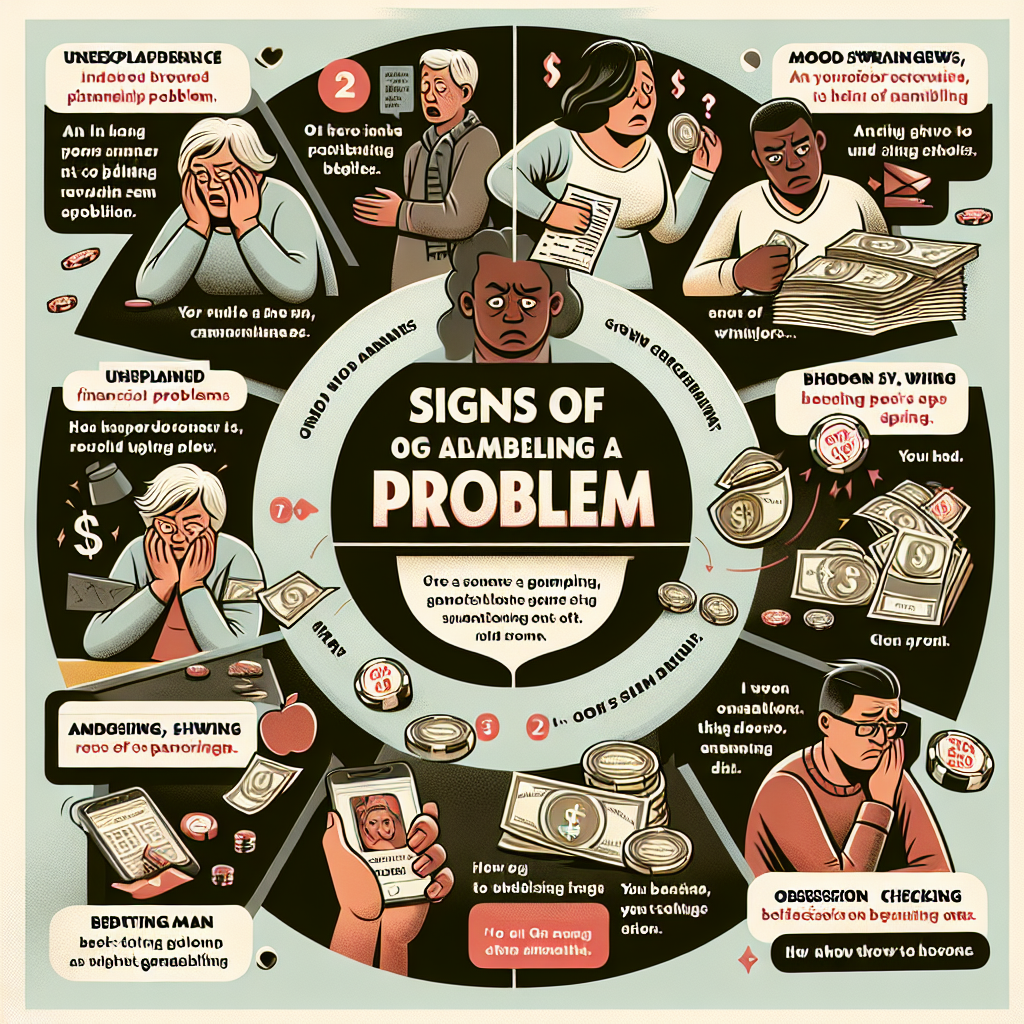-
Table of Contents

“Spot the Signs: Protect Your Loved Ones from Gambling Addiction”
Introduction
Recognizing the signs of a gambling problem in a loved one is crucial for early intervention and support. Gambling addiction, also known as compulsive gambling or gambling disorder, can have devastating effects on an individual’s financial stability, relationships, and overall well-being. It often starts subtly, making it challenging to detect until significant damage has occurred. By understanding the common indicators of a gambling problem, such as preoccupation with gambling, increasing bets to achieve the same thrill, lying about gambling activities, and experiencing withdrawal symptoms when not gambling, you can better identify and address the issue. Early recognition and intervention can help mitigate the negative consequences and guide your loved one towards the necessary help and resources for recovery.
Identifying Behavioral Changes: Key Indicators of a Gambling Problem in a Loved One
Recognizing the signs of a gambling problem in a loved one can be challenging, yet it is crucial for providing timely support and intervention. Behavioral changes often serve as the first indicators that something may be amiss. By paying close attention to these shifts, you can better understand the underlying issues and take appropriate action to help your loved one.
One of the most telling signs of a gambling problem is a noticeable change in financial behavior. If your loved one suddenly becomes secretive about their finances, frequently borrows money, or has unexplained debts, these could be red flags. They might also start selling personal belongings or taking out loans without a clear reason. These financial inconsistencies often stem from the need to fund their gambling activities or to cover up losses, making it essential to address these concerns openly and compassionately.
In addition to financial changes, emotional and psychological shifts can also indicate a gambling problem. Increased irritability, anxiety, or mood swings may become apparent, especially after gambling sessions. Your loved one might also exhibit signs of depression or express feelings of guilt and shame. These emotional changes can be particularly telling if they coincide with gambling activities, as the highs and lows of winning and losing can significantly impact their mental state.
Social withdrawal is another key indicator to watch for. A person struggling with a gambling problem may start to isolate themselves from family and friends, preferring to spend time alone or with other gamblers. They might miss important events, neglect relationships, or show a lack of interest in activities they once enjoyed. This withdrawal often stems from a desire to hide their gambling habits or from the time-consuming nature of gambling itself.
Moreover, changes in daily routines and habits can also signal a gambling problem. If your loved one begins to spend an excessive amount of time on gambling websites, at casinos, or engaging in other forms of gambling, this could be a cause for concern. They might also start to neglect responsibilities at work, school, or home, prioritizing gambling over other important aspects of their life. This shift in priorities can lead to a decline in performance and an increase in stress, further exacerbating the problem.
Another subtle yet significant indicator is the presence of deceitful behavior. Your loved one might lie about their whereabouts, the amount of money they have spent, or the extent of their gambling activities. They may also make excuses to justify their behavior, such as claiming they are trying to win back lost money or that they are gambling for entertainment. This pattern of dishonesty can erode trust and create tension within relationships, making it essential to address these issues with empathy and understanding.
Recognizing these behavioral changes is the first step towards helping your loved one overcome their gambling problem. It is important to approach the situation with compassion and without judgment, as this can encourage them to open up about their struggles. Offering support and suggesting professional help, such as counseling or support groups, can make a significant difference in their journey towards recovery. By staying vigilant and proactive, you can play a crucial role in helping your loved one regain control of their life and break free from the grip of gambling addiction.
Financial Red Flags: How to Spot the Signs of Gambling Addiction in Someone Close
Recognizing the signs of a gambling problem in a loved one can be challenging, but it is crucial for their well-being and financial stability. One of the most telling indicators of a gambling addiction is the presence of financial red flags. By understanding these signs, you can take the first step toward helping your loved one regain control over their life.
Initially, you might notice unexplained financial difficulties. Your loved one may frequently borrow money, max out credit cards, or take out loans without a clear reason. These behaviors often stem from the need to fund their gambling activities or to cover losses. Additionally, they might sell personal belongings or valuable items, which can be a desperate attempt to obtain quick cash. If you observe these patterns, it is essential to approach the situation with empathy and concern.
Another significant red flag is the sudden and unexplained disappearance of money or valuables. If your loved one is constantly short on cash or if household items start to go missing, it could indicate that they are pawning or selling possessions to support their gambling habit. This behavior can lead to a cycle of financial instability, making it even more challenging for them to break free from their addiction.
Moreover, you might notice that your loved one is secretive about their finances. They may become defensive or evasive when questioned about their spending habits or financial situation. This secrecy often stems from shame and guilt associated with their gambling problem. It is important to approach these conversations with sensitivity, as accusations or confrontations can lead to further withdrawal and secrecy.
In addition to these financial red flags, changes in behavior and mood can also signal a gambling problem. Your loved one may become increasingly irritable, anxious, or depressed, especially after gambling losses. They might also withdraw from social activities or neglect responsibilities at work or home. These behavioral changes can be a result of the stress and emotional toll that gambling takes on an individual.
Furthermore, you may observe that your loved one is preoccupied with gambling. They might frequently talk about gambling, spend excessive time on gambling websites, or constantly check sports scores and betting odds. This obsession can interfere with their daily life and relationships, leading to further isolation and financial strain.
Recognizing these signs is the first step toward helping your loved one. It is essential to approach the situation with compassion and understanding. Encourage open and honest communication, and let them know that you are there to support them. Offer to help them seek professional assistance, such as counseling or support groups, which can provide the necessary tools and resources to overcome their addiction.
In conclusion, spotting the financial red flags of a gambling problem in a loved one requires vigilance and empathy. By being aware of unexplained financial difficulties, secretive behavior, and changes in mood and behavior, you can identify the signs of a gambling addiction. Remember, your support and understanding can make a significant difference in their journey toward recovery. Together, you can help them regain control of their finances and their life, fostering a healthier and more stable future.
Q&A
1. **Question:** What are some behavioral signs that a loved one might have a gambling problem?
**Answer:** Behavioral signs can include secrecy about finances, frequent absences, lying about gambling activities, borrowing money frequently, and neglecting responsibilities or relationships.
2. **Question:** What emotional signs might indicate a gambling problem in a loved one?
**Answer:** Emotional signs can include increased irritability, anxiety, depression, mood swings, and defensiveness when confronted about gambling habits.
Conclusion
Recognizing the signs of a gambling problem in a loved one involves observing changes in their behavior, financial situation, and emotional state. Key indicators include preoccupation with gambling, lying about gambling activities, borrowing money frequently, neglecting responsibilities, and experiencing mood swings or irritability. Noticing these signs early can prompt timely intervention and support, potentially mitigating the negative impacts of gambling addiction.



